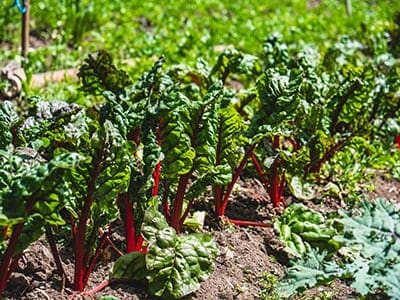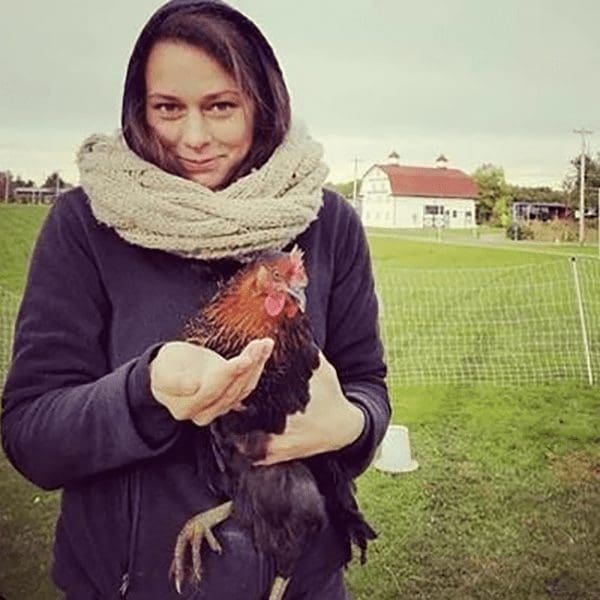
Sustainable Business Management Focus Area:
Sustainable Food and Farming
Bachelor of Science
Turn your passion for locally-sourced foods
into a career that matters.
Are you a locavore? Do you visit the farmers market on weekends and wonder what it takes to make a living doing what you love, while promoting sustainability? Now’s the time to find out. Unity Environmental University is offering you the opportunity to learn how to take your passion for locally sourced food and turn it into a fulfilling career.
Program Overview
Students who choose Unity Environmental University’s BS in Sustainable Business Management with a focus on Sustainable Food and Farming will have opportunities to build the skills needed to become leaders in the organic and sustainable food production industry and to understand the importance of the responsible utilization of natural resources. The program helps learners build practical expertise and professional skills for managing farming operations, Farm to Table Enterprises, and other businesses in the sustainable food system sector.
Career Outlook
Earn Your Degree
A world awaits
Median average salary for General Manager.
Projected 10-year growth rate for a General Manager.
Median average salary for a Operations Manager.
Median average salary for General Manager.
Projected 10-year growth rate for a General Manager.
Median average salary for a Operations Manager.
Source: Burning Glass Technologies. “Labor Insight™ Real-Time Labor Market Information Tool.” Updated March 11, 2020.
Experiential and Immersive Coursework

Farm to Table
Students explore organic food production systems and learn how to grow food using ecologically informed methods. They also learn how to put these methods into practice from a business operating perspective. Students learn maintenance and safety practices for these systems.

Sustainable Agriculture for Small Farms
Viewing the farm as an ecosystem, learners will explore the relationships between soil and plant health. They will evaluate strategies for monitoring and maintaining soil health, capturing and using water efficiently, managing pests, and using season extension structures. The course culminates in the development of a farm management plan that incorporates sustainable practices to deliver the best outcomes.

Understanding the Sustainable Business Landscape
This course introduces students to business with a focus on an organization’s environmental and social impact. Students will learn about the basics in corporate social responsibility, supply-chain management, finance, and non-financial reporting and accounting. All of which can be used for future internships and career opportunities.
Degree Requirements and Courses
The BS in SBM with a focus on Sustainable Food and Farming degree requires 120 credits, including 30 that must be completed at the 300 level or above. You may transfer in up to 90 credits from outside accredited institutions. For more details, browse our Sustainable Business Management Sustainable degree checklist. View our full course catalog for a better look into your program, then apply online for free to get started.
Frequently Asked Questions
-
What is Sustainable Food and Farming?
Sustainable food and farming is a transformative approach to agriculture that prioritizes the health of our environment, economy, and communities. It focuses on producing food in ways that are ecologically sound, economically viable, and socially responsible.
This includes practices like crop rotation, organic farming, and reducing chemical inputs to enhance soil health and biodiversity. Sustainable farming supports local economies, reduces carbon footprints, and ensures food security by creating resilient agricultural systems. It's about nurturing the land while providing nutritious food for future generations. -
What courses will I be taking?
General Education Core: 27 credits
Environmental Professional Core: 13 credits
Elective Courses: 50 credits
Program Core: 30 credits- COMM 401: Using Social Media in a Global World
- ECON 303: Macroeconomics for a Sustainable Planet
- ENVS 101: Sustainable Solution to Globalization
- FINC 201: Business Administration: Enterprise Accounting
- FINC 401: Impact Investment for a Sustainable World
- MGMT 201: Corporate Sustainability: Frameworks and Standards
- MGMT 301: Starting Your Small Non-Profit
- MGMT 403: Global Chain Supply Operations: Greening Your Business
- MGMT 405: Achieving Net Zero through Carbon Accounting
- MKTG 301: Environmental Marketing and Branding
For course requirements and a better look into your program, view our full course catalog. Then apply online for free to get started.
-
How much does it cost?
Your online education should be affordable and manageable. Our team of distance education concierges will work with you through the admissions process to help you plan and pay for your degree. Learn more about the costs here.
-
How fast can I finish?
Our comprehensive 120-credit program can be tailored to fit your schedule and goals! Completion time is flexible, determined by the number of credits you choose to take each term (8 terms/year) and less time with transfer credits. Without transfer credits, you can anticipate the following completion times:
- 48 credits/year: Fast-track your education in only 2.6 years
- 30 credits/year: Achieve your degree in 4 years
- 24 credits/year: Complete in just 5 years
Program Features
High Value Education: Nationally recognized for the quality of our programs delivered at an affordable price.
Social Mobility: Unity ranks in the top 2% of colleges in the U.S. for fostering upward mobility.
Sustainability Core: All programs are committed to sustainable practices, preparing you for a future of environmental awareness in all fields.
Flexible Learning: Balance work and education effortlessly by choosing when and where you want to study.
Flexible Start Dates: 8 start dates per year allows you to control your schedule
Personalized Guidance: Benefit from individualized academic and professional advising, where we are dedicated to turning your career and academic aspirations into tangible achievements.
Transfer-Friendly: Shorten your academic timeline, since we accept up to 90 credits to value your prior academic achievements.
Faculty Profiles
















